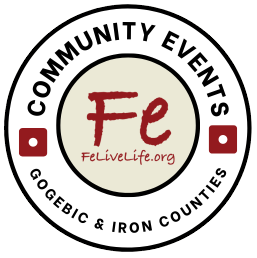This class will take place March 21, March 28, April 4, 2023 from 2:00-3:30p.m. at the Iron County Board Room in Hurley, with a stargazing field trip on April 11, 8:00-9:30p.m.
Join Jim Head of the Northwoods Explorers of Space and Astronomy for this fascinating class on stargazing for beginners!
Class One, The Solar System:
We’ll cover how stars and solar systems develop, how elements are created, comparison of our solar system with others with size and distance scales using different methods of measurement. We’ll show how to find your way in the night sky using constellations and associated coordinate systems. We explain the different types of stars, the magnitude system, earth seasons, precession, eclipses, moon phases, comets, and asteroids. We’ll describe the planets in our solar system and the best times to locate them using planetarium tools. We’ll describe how to watch Aurora, Meteor Showers, and how to use a camera to gather additional detail. The class will have the opportunity to inspect an actual 4.5-billion-year-old meteorite. We’ll explain the different kinds of binoculars, and which are best for observing the night sky. If weather and time permit, we’ll step outside to observe a few objects using binoculars and a small telescope. We use laser pointers that travel for miles to make it easy to point to objects in the night sky. There will be a few handouts related to the information presented along with references for further study.
Class Two, The Milky Way Galaxy
We’ll cover how galaxies develop, the size and scale of the Milky Way galaxy, and how it compares to other galaxies. We’ll explain light years, interstellar space, planetary nebulae, reflective and emission nebulae, globular clusters, open clusters, black holes, magnetars, Wolf-Rayet stars, variable stars, and exoplanets. We’ll show how to use binoculars or a small telescope to view distant objects in the night sky and explain the different types of catalogs in use today. We’ll show how the differences in the human eye affect observations, filters to diminish light pollution and to enhance observing, and an introduction into video astronomy using specialized cameras. If weather and time permit, we’ll step outside to observe a few objects using binoculars and a small telescope. We use laser pointers that travel for miles to make it easy to point to objects in the night sky. There will be a few handouts related to the information presented along with references for further study.
Class Three, The Universe
We’ll explain and examine the evidence that supports the Big Bang, Dark Energy, and Dark Matter theories. We’ll explain Quasars, Active Galactic Nuclei, Galaxy clusters, the great attractor, super clusters, and the size and scale of the observable universe compared to the entire universe. We’ll show why certain times of the year are best to observe distant objects using binoculars or a small telescope. If weather and time permit, we’ll step outside to observe a few objects using binoculars and a small telescope. We use laser pointers that travel for miles to make it easy to point to objects in the night sky. There will be a few handouts related to the information presented along with references for further study.
Class Four, Field Trip
We’ll put our new knowledge into practice on a field trip on April 11! (Location TBA.)
There are a few spots left, so please learn more and sign up at feuniversity.org!

